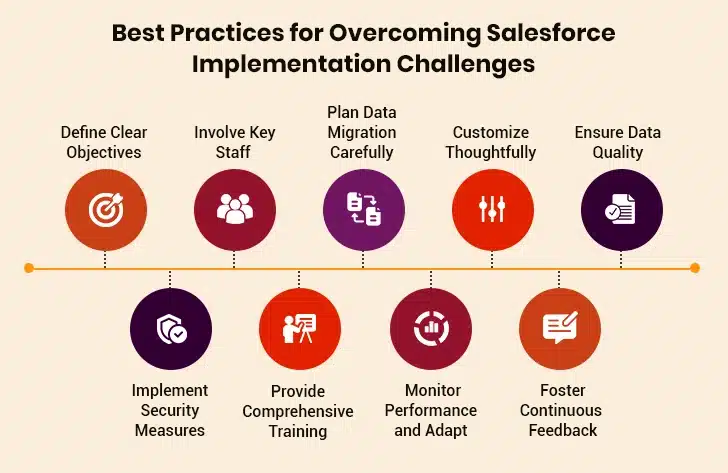Used by 150,000 companies across the globe, Salesforce CRM aims to save time and effort and offer businesses a better understanding of their customers’ needs. There’s no dearth of things you can do with the successful implementation of Salesforce in your organization including creating a dynamic database of customers, automation of communication, etc. However, the peak performance of a Salesforce instance really boils down to how well it gets implemented in an organization.

Nevertheless, the journey of implementing Salesforce development services itself comes with its own set of challenges, resulting in businesses running into problems during the implementation phase. In this blog post, we’ll have a look at the common challenges faced by businesses and how you can hire Salesforce developers that help overcome these challenges.
Salesforce Implementation – Key Challenges and Their Solutions
Salesforce CRM implementation comes with a multitude of challenges. Listed below are some of the common roadblocks (and their solutions) you may face during the implementation process.
1. Complexity of Salesforce Data Migration
Data migration complexity is one of the key challenges encountered during the implementation process. Businesses often struggle with the process of transferring their current data into Salesforce CRM. Seamless transfer calls for mapping data fields, guaranteeing data integrity, and managing the process of migration without any disruption to everyday business operations.
Solution:
A proficient Salesforce development company comprehends the complexities involved in data migration and uses industry best practices to overcome these challenges. With the help of rigorous planning, data cleansing, and validation, the professionals ensure a smooth transition, reducing the risk of data loss or corruption during the process of migration.
Seamless Data Migration: Best Practices in Salesforce Implementation Services
2. Alignment of Customization
The workflows and processes of every business are unique, and this makes aligning Salesforce CRM with existing customizations challenging. It is vital that Salesforce developers address this requirement of customization to make sure that the platform meets the particular requirements of the organization.
Solution:
Expert Salesforce development companies do more than basic integration and customization. They collaborate closely with businesses to comprehend their work processes and customize Salesforce CRM to smoothly integrate with existing business processes. To do this, custom fields, workflows, and processes must be modified to create a unified and effective system.
How Salesforce Development Help You Address CRM Customization Challenges
3. Effective Communication and Updates in Real-time
Real-time updates and efficient communication are essential for businesses using Salesforce CRM. To provide timely updates on crucial information like customer interactions, leads, and opportunities, Salesforce app development experts must overcome challenges pertaining to maintaining flawless communication between Salesforce and other business systems.
Solution:
Professional Salesforce developers create strong integration solutions by utilizing middleware and APIs. This makes it possible for Salesforce CRM and other systems to communicate in real-time, ensuring that the data is always current. Businesses are empowered to make timely, well-informed decisions owing to this real-time capability.
Future-proof Your Business with Salesforce Development Services
4. User Adoption and Training
When introducing a robust tool such as Salesforce CRM, people used to legacy systems typically oppose the change. Overcoming challenges pertaining to user adoption and training is necessary for a successful implementation. The advantages of Salesforce development services cannot be fully realized if users are not effectively trained and encouraged to adopt the new system.
Solution:
An experienced Salesforce developer understands the significance of change management. They offer comprehensive training programs, user-friendly documentation, and continuous support to guarantee a seamless transition. By cultivating a culture of enthusiasm and acceptance for the new system, they facilitate broad user adoption.
5. Scalability Factors
As businesses grow, so do their operational needs. And with the ever-increasing operation, the CRM system is required to do more aligned to the changing scale of the business requirements. Therefore, scalability issues must be addressed by a Salesforce developer to guarantee that the implemented solutions can expand with the company. A failure to scale effectively can impede success in the long term.
Solution:
An ideal Salesforce implementation partner or development company prioritizes creating scalable solutions. When business needs evolve, they create integration architectures that are easily adaptable to new modules, features, and functionalities. This strategy ensures that Salesforce CRM remains a flexible and dynamic platform.
6. Security Challenges
Since customer data and business processes are sensitive, security becomes a top priority for Salesforce developers. The implementation of strong security measures is pivotal to overcoming issues related to security, such as data breaches and unauthorized access.
Solution:
Security is offered the utmost priority by experienced Salesforce developers at every stage of the implementation process. This involves putting role-based access rules into place, encrypting data while it is in transit and at rest, and keeping an eye out for any security threats at all times. Businesses can feel secure knowing that their data is protected within the Salesforce ecosystem as security concerns are addressed head-on.
Must Have Tactics to Deliver Salesforce Implementation Successfully
Best Practices for Overcoming Salesforce Implementation Challenges
Salesforce implementation may encounter a host of challenges. Fortunately, you can overcome all the roadblocks by religiously following the best practices given below.

I. Define Clear Objectives
Before you begin the implementation process, it is crucial to define your objectives clearly. This helps guide the implementation process whilst overcoming roadblocks. This clarity is crucial for successful Salesforce CRM implementation.
Key Aspects:
- Set specific goals for the implementation process
- Identify key areas to improve within the organization
- Align objectives with overall business needs
- Clearly communicate goals to all stakeholders
- Use objectives to measure the CRM implementation success
- Adjust plans as needed based on feedback and results
II. Involve Key Staff
Getting the right people involved early is important. Talk to your team members who will use Salesforce daily. Ask for their input and ideas. This helps make sure the system works well for everyone. When staff feel included, they are more likely to use it.
Key Aspects:
- Involve all key staff right from the beginning of the project
- Explain how implementation will help them in their roles
- Seek feedback and input regularly from them
- Ensure key members are trained properly on new systems
- Encourage open communication among all key members
- Address any concerns or issues promptly
III. Plan Data Migration Carefully
Moving data to Salesforce needs attention. Check all your old data for mistakes before transferring it. Decide what information is really needed. Doing this step carefully saves time later. Rushing can lead to errors, making work harder for everyone.
Key Aspects:
- Identify data to be migrated from existing systems
- Clean and organize the data before migration
- Map data to appropriate Salesforce fields carefully
- Test data migration thoroughly to avoid errors
- Address any data issues promptly during the process
- Document the migration process for future reference
IV. Customize Thoughtfully
Salesforce can be adjusted to fit your needs, but too many changes can cause problems. Only make necessary updates. Keep things simple so users don’t get confused. Small, useful tweaks work better than big, complicated ones.
Key Aspects:
- Use standard features whenever possible to simplify
- Align customizations with business processes and needs
- Avoid over-customization that can lead to issues
- Test customizations thoroughly before deployment
- Document all customizations for future maintenance
- Review customizations regularly to ensure they remain relevant
V. Ensure Data Quality
Good data helps you make better decisions. Remove duplicates and fix errors regularly. Keep information up to date. Clean data makes reports accurate and tasks easier. A little effort here saves a lot of trouble later.
Key Aspects:
- Implement data validation rules to prevent errors
- Manage duplicates effectively to maintain data integrity
- Clean data regularly to ensure accuracy and completeness
- Update data as needed to reflect changes in the business
- Monitor data quality metrics to identify areas for improvement
- Use data for informed business decisions
VI. Implement Security Measures
Protecting sensitive data is the need of the hour. Use CRM security features to ensure data safety and adherence to industry regulations, like GDPR, CCPA, HIPAA, and more.
Key Aspects:
- Set up role hierarchies to control access levels
- Use sharing rules and field-level security to protect data
- Implement data backup and archiving processes regularly
- Monitor data access regularly to detect unauthorized use
- Train users on security best practices and policies
- Review security settings periodically to ensure they remain effective
VII. Provide Comprehensive Training
Teach your team how to use Salesforce properly. Training should cover basics and common tasks. Clear instructions help users feel confident. When people know how the system works, they use it better.
Key Aspects:
- Design a training plan for all users of the system
- Cover basic and advanced features in the training sessions
- Provide ongoing support and resources for users
- Encourage feedback from users to improve training
- Use digital platforms for continuous learning and updates
- Evaluate training effectiveness regularly to make improvements
VIII. Monitor Performance and Adapt
Check how well Salesforce is working after setup. Look for issues and fix them quickly. Be ready to make small changes if needed. Regular checks keep the system running smoothly.
Key Aspects:
- Set up performance metrics to measure success
- Monitor user adoption and gather feedback regularly
- Adjust configurations as needed based on feedback
- Conduct regular system audits to identify issues
- Address any issues promptly to maintain system health
- Regularly assess and improve the implementation
IX. Foster Continuous Feedback
Ask users for their opinions often. Listen to their problems and suggestions. Improving the Salesforce based on real feedback makes it more useful. When people see their ideas matter, they stay engaged.
Key Aspects:
- Establish feedback channels for users to share concerns
- Encourage open communication among all key members
- Address concerns promptly to build trust and confidence
- Use feedback to improve processes and workflows
- Conduct regular user surveys to gather insights
- Recognize and reward feedback contributors to encourage participation
How to Expedite Salesforce Implementation with Sure-Shot Success
Key Factors to Choose a Reliable Salesforce Implementation Partner
There are several factors that one should keep in mind when looking for a Salesforce implementation partner. Listed below are some key factors that will help you choose the right Salesforce partner.
1. Check Skills and Certifications
It is vital to choose Salesforce partners who are skilled and have certifications. Certificates prove they’re not beginners and know how to build a good toolkit.
Having certificates like Admins, Developers, and Architects shows that the partner undergoes regular training and can create the right tools for you.
2. Check If They Know Your Industry
Any tool or platform is only as good as the people using it. Salesforce is a popular CRM that can be used for any type of business. However, investing in Salesforce application development requires sound knowledge of the cloud computing market. Therefore, it is important to find experts who belong to your industry.
Knowing your industry helps them recommend the best ways to set up Salesforce and pre-built solutions that make things easier. This also helps you avoid mistakes and losing customers. Since Salesforce is always updating and adding new features, it’s important to find someone who stays skilled.
3. Make Sure They Communicate Well
Even if you have a great system, poor communication can ruin everything. A professional Salesforce partner understands your needs and asks the right questions. This helps them bring unique ideas to life.
Ask them how they communicate, how often they provide updates, and what they expect from you. If possible, ask for cases, when Salesforce partners were adaptable in collaboration. This will give you a good idea of your potential collaboration. Clear communication prevents misunderstandings and lets them quickly change direction if needed.
Here’s how to check their communication skills:
- Have a trial meeting: This will let you see how they behave and if their style will work for you.
- Look at client references: Find their previous clients and ask how the collaboration went.
- Ask for a sample plan: If possible, ask for a communication plan to assess how it defines updates and information delivery.
4. Check for Educational Resources
Reviews don’t always tell you everything about a CRM implementation partner. See if the company has educational guides, ebooks, and thought leadership blogs. This shows that they know what they’re talking about and can solve problems with your Salesforce account.
Summing Up
Businesses wishing to realize the full potential of Salesforce CRM need to overcome challenges in Salesforce development services. Partnering with an expert Salesforce development company is essential for a successful implementation, as such a company can effectively navigate the complexities of data migration and address security concerns.
With organizations recognizing the transformative power of Salesforce CRM in improving customer relationships and streamlining operations, the significance of overcoming these challenges cannot be overstated. With the help of the right expertise and a strategic approach, organizations can leverage the potential of Salesforce app development experts to accelerate their growth, boost efficiency, and stay ahead in the competitive business environment of today.





